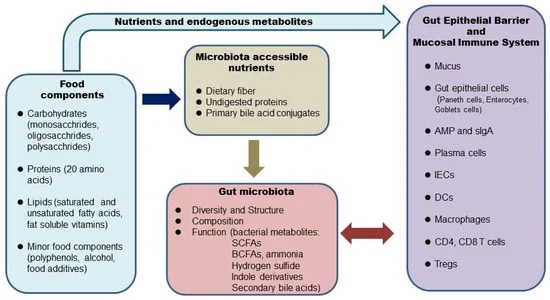The gut microbiome, or gut microbiota, also termed commensal, refers to the entire microbial community that populates the mammalian gastrointestinal (GI) tract, with the majority residing in the colon. Through generating a diverse array of metabolites, the gut microbiome interacts with the gut epithelium and the intestinal mucosal immune system to maintain gut homeostasis, thus forming a symbiotic relationship with the host.
Diet can disturb gut homeostasis by influencing the diversity, composition, and function of the gut microbiome. A nutritionally balanced diet is critical for maintaining a healthy gut microbiome, the integrity of the intestinal barrier, immune tolerance, and normal gut physiology, whereas an unbalanced diet, like the typical western diet, results in reduced diversity and dysbiosis of the gut microbiome, which can lead to a leaky gut and chronic inflammation, as seen in inflammatory bowel disease (IBD).
In a study published in International Journal of Molecular Sciences, Prof. ZHANG Ping of Xishuangbanna Tropical Botanical Garden (XTBG) reviewed food and nutrition factors that affect gut health by influencing the interplay of the gut microbiome with the epithelium and intestinal mucosal immune system.
The researcher also discussed the influence of the diet on the gut microbiome-host immune system interaction in inflammatory bowel disease. According to the review, a nutritionally balanced, whole food-based fiber-rich diet not only provides the host with all necessary nutrients but also nourishes a healthy gut microbiome with high diversity and well-balanced composition. Food choices must take the gut microbiome into account for intestinal and overall health.
The researcher suggested that more research is needed to look at diet-gut microbe interactions in health and the molecular mechanisms of how dietary components or nutrition status contribute to intestinal immune homeostasis.
“Understanding the influence of the diet on the interaction of the gut microbiome and the host immune system will be useful in developing nutritional strategies to maintain gut health and restore a healthy microbiome in IBD,” said ZHANG Ping.
Contact
ZHANG Ping Ph.D
Center for Integrative Conservation, Xishuangbanna Tropical Botanical Garden, Chinese Academy of Sciences, Menglun, Mengla, Yunnan 666303, China
E-mail: zhangping@xtbg.org.cn

Influence of Foods and Nutrition on the Gut Microbiome. (Image by ZHANG Ping)

